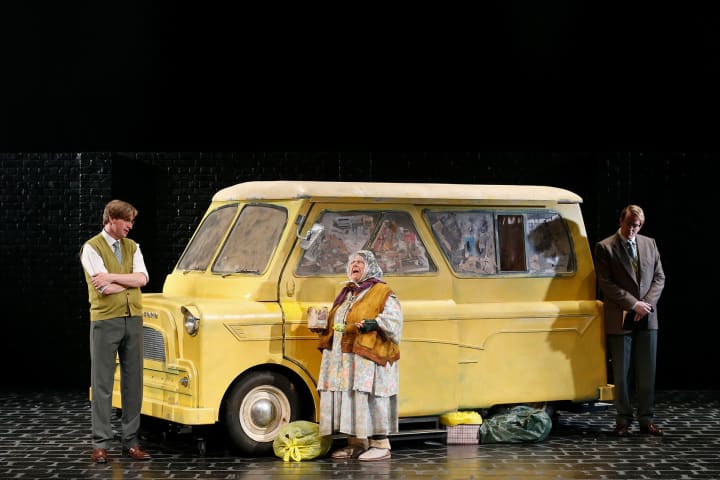Dan Frederiksen grew up in Kyneton, which in his youth, held the title for the highest rate of youth suicide in Victoria, and had an economy that ran on the success of the town’s abattoir.
Kyneton is a town that now lays claim to a growing population of creatives, who benefit from the approximate one-hour commute to Melbourne’s CBD on the V/Line. The town has changed inordinately in Frederiksen’s lifetime. ‘Renaissance’ is not the right word, he tells me, as that would imply Kyneton was once pleasant, he says brazenly. ‘It was just punch-ons on the oval and teen pregnancies,’ he grins before turning more sombre. ‘But really, it was a seriously rough place.’
These ‘rough’ country roots, whether he recognised them growing up or not, would prepare Frederiksen for the capricious working life of an actor.
Frederiksen’s career has ultimately been a successful one. He spent two and half years playing Mr. Wormwood, in Tim Minchin’s Helpmann Award-winning production Matilda: The Musical. He has appeared in multiple productions for Melbourne Theatre Company, including Cheech, Don Juan in Soho, Rockabye, Becky Shaw, Dead Man’s Cell Phone and Abigail’s Party, as well as playing various roles in TV and film over the last two decades. Like most successful actors, however, his rolling list of credits doesn’t equate to financial security or any surety that next year, or even next week, he will have work.
It’s a livelihood that dances on the precipice of the next great project, or the next spell of unemployment and the emotional turmoil that ensues. To be an actor, or any creative person that conducts their life this way, requires a base level of privilege, he says, and an acceptance from family and friends that this vocation, is a valid one. ‘I couldn’t be an actor if I wasn’t ostensibly “middleclass”,’ he says. ‘It takes an enormous amount of sacrifice that I probably couldn’t make if I didn’t have the support that I do.’
There are many aspects of Frederiksen’s career, and life, which will inform his role in The Lady in the Van, directed by Dean Bryant. The play follows the autobiographical story of writer Alan Bennett, who in 1974 befriended the homeless and stubborn Miss Mary Shepherd, when she parked her van in his London driveway and stayed for 15 years.
It’s a work that questions the foundation of Frederiksen’s upbringing, one in which his left-leaning parents assured him there was a social order in place that caught the disaffected and prevented people from falling through the cracks. It’s a world that Frederiksen isn’t convinced exists, as Melbourne’s housing crisis worsens and the city’s homeless population grows. It’s a social order that the play’s protagonist Miss Shepherd certainly wasn’t privy to.
Frederiksen plays Alan Bennett 1, while his former co-star in Matilda, James Millar, plays his character’s subconscious, Alan Bennett 2. ‘I love that device’ Frederiksen says. ‘It’s so clever because we all have that internal dialogue, and I’m guilty of being like Alan Bennett 1, constantly trying to please people…often to my own detriment.’
Despite the challenges both Bennett and Shepherd encounter in this story, Frederiksen believes it is ultimately a tale of friendship, acceptance and, where possible, of not letting people fall through the cracks, however abhorrent they may seem. ‘The reality is, the world is filled with people who have addictions and mental illnesses, who don’t have the support networks and safety nets that the rest of us are lucky enough to have.’ They’re often referred to in the media as ‘rough sleepers’, which Frederiksen finds irritating and ultimately wrong. ‘This isn’t a lifestyle choice,’ he says, ‘these people are homeless. They don’t have homes.’
We gather from this story that Miss Shepherd was fiercely private and rejected intervention of any sort. Does Frederiksen see any exploitation in the real life Alan Bennett telling her story as he remembers it? I ask.
‘It’s hard to say, because essentially he is a writer, it’s in his soul, and his being, to find source material in the world around him. He can’t help that.’ But would Miss Shepherd be comfortable knowing that her condition had been written about and performed by some of the world’s most iconic actors such as Maggie Smith? His answer is probably not, Frederiksen thinks. But it cannot be refuted that by telling Miss Shepherd’s story, Bennett has helped elucidate a very real problem in our society, and that is a lack of empathy.
According to Frederiksen, Bennett uses Miss Shepherd as a vehicle to explore our own parameters of empathy, and to ask us what we’d be prepared to put up with if a homeless and mentally unstable woman parked her van in our respective driveways for 15 years. How much would we tolerate?
The Lady in the Van plays at Arts Centre Melbourne, The Playhouse from 2 February — 6 March.
Published on 19 December 2018





